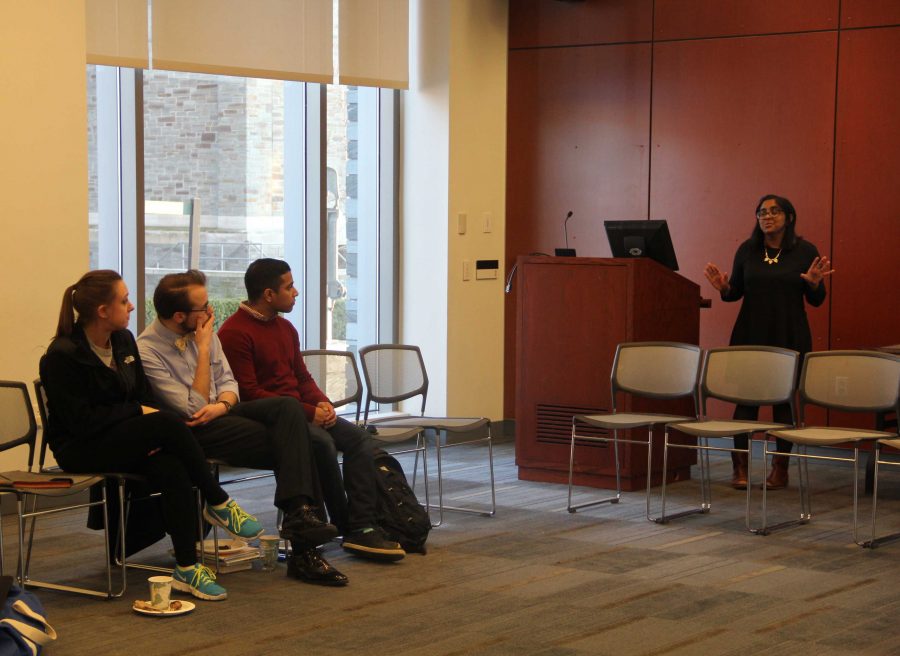By Joe Vitale
How many planet Earths would there need to be if every person lived like you did? How would conservatives — who are often pigeonholed as climate change-deniers — work to make a more sustainable planet? And what has Pope Francis been saying about the relationship between social justice and stewardship to the planet?
This range of questions and more will be answered in events during this year’s Sustainability Week, hosted by the Sustainability Committee from Sept. 25 to Oct. 2.
The week of events includes talks and movie screenings, and is meant to provide some insight on the intersections of politics, culture, social justice and economics with sustainability.
Duncan Magidson, FCRH ’16, the communications chair of the Sustainability Committee, said the week of events is a way of beginning a dialogue with the Fordham community.
“We work throughout the year on improving sustainability on campus, but during this week, we have the opportunity to hear a broader array of voices,” Magidson said.
The College Republicans, for example, will host a discussion on the Republican party and its relationship with environmental causes. The event, set to host a speaker from Conservamerica, a conservative leaning group that focuses on environmental conservation, will address how conservatives are looking to approach climate change on the global level.
An event on Wednesday, Sept. 30, titled “How many Earths?” will address living sustainably. Presented by the Sustainability Committee, the event will help students calculate how many planet Earths it would require if every person lived like they did.
“We hope that our work helps people recognize that they are not alone in their concern for the environment,” he added. “We try to offer ways for people to get involved, whether through the committee, in other sustainable organizations on campus or in the actions they take in their every day lives.”
Many of the events are co-sponsored and are meant to focus on issues surrounding sustainability.
An event on Friday, titled “Social Justice and Sustainability,” will address the relationship between the Jesuit definition of social justice and environmental justice. The event, set to feature various faculty members and community organizers and hosted by the Dorothy Day Center for Service and Justice, will look at how these two issues intersect and examine how Bronx communities are being affected.
Campus Activities Board (CAB) and Students for Environmental Action and Justice (SEAJ) will co-host a showing of the 2009 documentary, The Cove. The film, which was an expose on controversial dolphin-hunting practices in Japan, will be followed by a discussion of progress in recent years.
The committee will also present on Thursday, Oct. 1, addressing urban ecology and sustainability. The speaker, Jason Aloisio, the founder of St. Roses Community Garden and St. Roses CSA, will discuss his career in urban ecology and its intersection with urban sustainability.
In recent years, Fordham has addressed the issue of sustainability in several ways, many of which are highly visible to students.
This semester, more recycling bins were placed in classrooms and in buildings across campus.
In years past, Fordham was recognized for having its first green building to be built on the historic Rose Hill campus in 2012. The building, Campbell, Salice & Conley Halls were awarded LEED Gold Certification. The new Law Building and McKeon residential tower are also certified as LEED buildings.
In addition, the university is also converting its fleet of Ram Vans to biodiesel, having purchased close to 40 new vans and achieving a reduction of 22 percent in carbon dioxide emissions.
The school, according to Magidson, also has plans to install automatic lights in classrooms to reduce electricity wasted when they are left on.
The organizers of the week’s events are hoping students live more sustainably beyond Sustainability Week.
During the events, the committee is hoping to encourage students toward sustainability-focused clubs like SEAJ or St. Rose’s Garden.
In addition, the group is looking to provide tips for students on campus, many of which revolve around the three R’s: reduce, reuse and recycle.
“The single most important thing you can do to reduce your ecological impact is to consume less,” Magidson said. “Avoid things like bottled water, which requires the production of a plastic product to contain something you can get for free out of the tap. And when you do purchase a product, avoid single-use products.”The Sustainability Committee is set to release a Sustainability Guide this semester.
Still, the group is looking to promote the issue on campus and push the university on developing its commitment to sustainability.
“There is a lot more the university could be doing to support the cause of sustainability,” said Magidson.
Things like dedicated departments, full-time faculty members, and “green grants,” that promote student-produced ideas, are all ways of promoting the issue on college campuses.
“We are looking to implement one of these programs at Fordham,” added Magidson.







































































































































































































